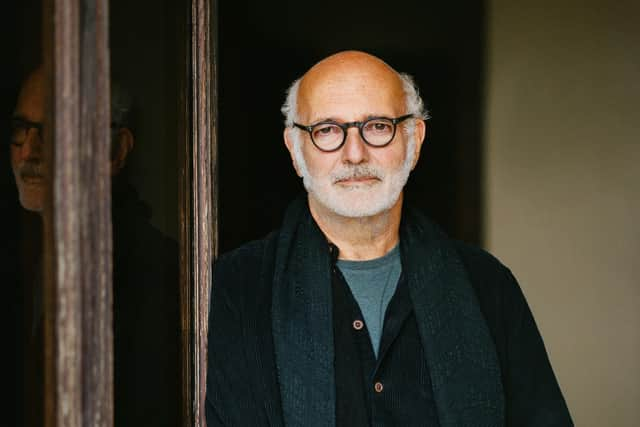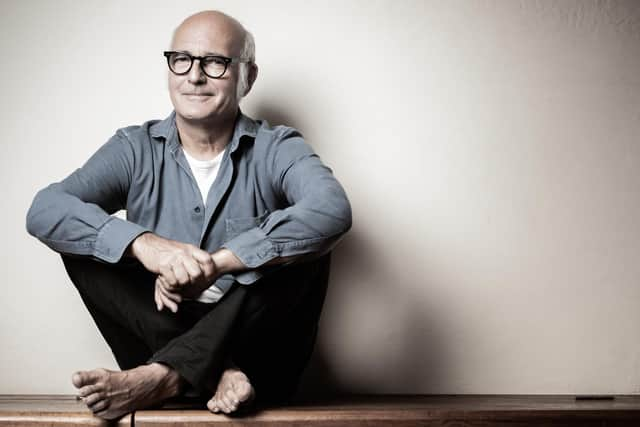Ludovico Einaudi: 'I have a very emotional connection with Leeds'
“I played in a church,” the 67-year-old tells The Yorkshire Post on the phone from his home in Piedmont. While he might not recall its name – “It was many years ago” – he says he has “very good memories of that concert”.
On Saturday, he will return to the city, to perform in the considerably larger setting of the First Direct Arena, and he’s looking forward to it. “I’m very happy to come back – in a different place, of course; I have a very emotional connection with Leeds,” he says.
Advertisement
Hide AdAdvertisement
Hide AdThe grandson of Luigi Einaudi, Italy’s first post-war president, the composer was born in Turin in 1955. His father Giulio was a book publisher, but it was his mother, Renata, the daughter of an opera conductor, who encouraged him to take up the piano.
“I was quite young, I think I was probably five years old,” Einaudi remembers. “I have to say honestly I didn’t like very much my teacher because she was very old-school and she was not able to make the experience for me beautiful and enjoyable, I had to go through those lessons with a bit of pain.
“I think the love of music was coming more from home, from my mother, because she was playing the piano and also she was listening to a lot of records, so we were spending time together with music at home. From there I took it up regularly and enjoyed my time with music – but not with the teacher.”
As a teenager, he studied at the Milan Conservatory, and would go on to learn from the avant-garde composers Luciano Berio and Karl-Heinz Stockhausen, both of whom would influence Einaudi’s approach to composition. “They were both very important,” he says. “More important, I have to say, because I spent more time with him, was Luciano Berio because I could study and work with him for two or three years. It was working on interesting projects around the world with beautiful performers and orchestras and theatres, this was my first experience of working in the world of music.
Advertisement
Hide AdAdvertisement
Hide Ad“From Luciano Berio, I learned a lot about orchestration, conducting and also I think ideas regarding music. Even though apparently our languages are very different, from me and Stockhausen there is not only an apparent gap but a real gap, but I took some important things from both of them. So even if my musical language is very much into the world of tonal music, the idea of developing topics like science and transcribing nature into music from Luciano Berio I took it and it’s still one of my main topics about how I create music.”


Another crucial influence was American minimalism. Einaudi recalls seeing his first Philip Glass concert in 1973 (“way before I met Luciano Berio“). “I remember it was in New York, he was playing with his project with electric organs,” he says. “There was no internet at the time, so I was calling his private number and there was a message on his answering machine giving information about the concert, his voice was saying it starts at 5pm. So I went there and I have to say I really enjoyed the concert.
“It was part of my initial background that was composed by the avant-garde music from Europe like Berio, Stockhausen and Boulez, but also by minimalists like Steve Reich and Glass.
“But also I remember there was an interesting composer from the UK that died young, Cornelius Cardew. He was considered one of the landmarks of minimal music, and I remember I went to see one of his concerts in the early Seventies in Italy, he was playing piano.”
Advertisement
Hide AdAdvertisement
Hide AdEinaudi was not immune to popular music either. “There was rock music and folk music that I really enjoyed very much. My generation was very much exposed through the records and the radio to a lot of different music compared to the generation before that was maybe purely into the classical, avant-garde world. We were more open to the boom of the Sixties.”


Since the 1980s, Einaudi has composed extensively for film, ballet and theatre. He says it is “always interesting“ to combine music with other artforms. “For me, the collaboration opens your perspective, your imagination to other worlds, to talk with other artists in different fields. Sometimes with a film or with a theatre or dance project you arrive to do something that you wouldn’t have done by yourself. Maybe the dance project is inspired by the flight of a group of birds so you have to compose a piece of music that is inspired by the movement that a group of birds are doing in the sky and you have to transcribe this for a piece, let’s say, for string orchestra. So it’s a different point of view that arrives to you and it could be very interesting to try it.”
With projects such as Cloudland, Nightbook, and In a Time Lapse, Einaudi found new ways of presenting piano music before 2015’s Elements took him out of traditional concert halls and into pop arenas. He says that came as a surprise.
“It was not in my artistic plan to play in such big spaces like arenas,” he says. “I remember at the arena in Verona and the Waldbuhne in Berlin, it’s open air with 22,000 people, I didn’t know how it might have been. In the beginning I was not sure, but I have to say that (despite) my first hesitation, I changed my mind when I experienced the feeling of playing in front of so many people in big spaces. It’s a different experience, of course; in a way you lose the intimacy when you play to 1,000 people. But then it’s equally as enjoyable, the sound of a big space, and of course it’s fantastic to have 10,000 people standing up at the end. It’s a very enjoyable vibration and emotion that you get from the audience. Also during the concert, it’s very powerful. You’re not losing the quality of what you’re doing because nowadays the arenas have fantastic sound systems and you can feel the sound on stage and you can listen outside beautifully.”
Advertisement
Hide AdAdvertisement
Hide AdShortly before the pandemic, Einaudi composed an opera, Winter Journey, first staged in Palermo and Milan. Also in 2019, he worked with the renowned French actress Isabelle Huppert on the Paris stage production of Mary Said What She Said. He says it was “very interesting’ to write the opera because he “always loved the world of musical theatre”.
“Even if my opera doesn’t have the same concept as Puccini or Verdi, it’s interesting to experiment with that language, the way you mix text with stage direction and music, and you tell a story or an idea through all these different media,” he says.
Winter Journey will be reprised in Naples in October.
“Mary Said What She Said was another beautiful experience because I always loved the work of (director) Bob Wilson, so I was looking forward to being able to work with him on a theatre project,” he adds. “As I said, the collaboration takes you into a different journey and it’s always beautiful to go on an artistic train with someone and try and learn somewhere.”
Einaudi’s track Experience recently became a huge hit on TikTok. He says it is “a strange experience“ as a composer taking classical music into new media. “After a while you open TikTok and you listen with football or you open Instagram and it’s in a dance video, it’s so popular that it’s not yours any more, it becomes something independent from you,” he says.
Advertisement
Hide AdAdvertisement
Hide Ad“It’s beautiful to see, I could never have imagined that this piece was going to become like this now. I was deeply convinced that there was a solid emotion in this piece of music, like with other pieces at that time, but I would never have imagined it would become what it has become today. It’s strange but nice that your repertoire reaches all of these different things.
“At the end of your life if you look, you have four or five pieces that are the most listened to, the rest is completely hidden, like the tip of the iceberg.”
On Einaudi’s UK tour he is going to be performing Underwater, which was his first new solo piano album for 20 years. He says it was inspired by the solitude of lockdown. “I was composing a piece of music every day at that time when nobody had an idea of the future, of how it was going to be. I didn’t even know if I was going to be able to play live, so I decided that I didn’t want to lose that time completely and I had a unique goal every day just to sit down and sketch an idea without thinking too much if it was a good idea or not. I just needed to have one every day.
“After a month or two I started to look at those ideas and I found that it was something quite interesting because every four or five days the wave of the ideas was like a sine wave that was going up and down, and every five days there was an idea that I was finding good, that was on the top of the wave then it was coming down again. Anyway I was starting to count and I noticed that after two months with a good idea every four or five days I had 15 or 20 sketches that were good for me.
Advertisement
Hide AdAdvertisement
Hide Ad“The other thing was making this very regularly it was a natural process, I was not judging what I was doing, so these ideas were spontaneous, without any filter, so it was like music that I cannot say where it was coming from. It was a beautiful sensation to look at this music and say ’how did I compose this?’”
Ludovico Einaudi plays at First Direct Arena, Leeds on Saturday October 21. https://ludovicoeinaudi.com/
